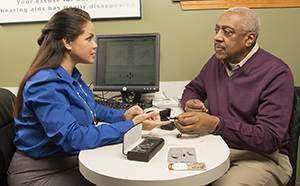Tinnitus is the term for a noise in your ear not caused by an outside sound. The noise might be a ringing, clicking, hiss, or roar. It can vary in pitch. The noise may be soft or very loud. For some people, this is a minor problem. But for others, the noise can make it hard to hear, work, and even sleep. When tinnitus can't be cured, treatments may help.
What causes tinnitus?
Loud noises, hearing loss, and earwax can cause tinnitus. So can certain medicines. Large amounts of aspirin or caffeine are sometimes to blame. In many cases, the exact cause of tinnitus is not known.
How is tinnitus treated?
The best way to treat tinnitus is to find and remove the cause. So your health care provider may refer you to an ear, nose, and throat specialist (ENT or otolaryngologist). Your hearing may also be checked by a hearing specialist (audiologist). If you have hearing loss, wearing a hearing aid may help your tinnitus. When the cause can't be found, the tinnitus itself may be treated. Some of the treatments are listed below. Your health care provider can tell you more about them.
-
Maskers. These are small devices that look like hearing aids. They have a pleasant sound that helps cover up the ringing in your ears. Hearing aids and maskers are sometimes used together.
-
Medicines that treat anxiety and depression. These may ease tinnitus in some people.
-
Hypnosis or relaxation therapy. This may help head noise seem less severe.
-
Tinnitus retraining therapy. This combines counseling and maskers. Both can help take your mind off the tinnitus.
To learn more
-
American Speech-Hearing-Language Association 800-638-8255 www.asha.org
-
American Tinnitus Association 800-634-8978 www.ata.org
-
National Institute on Deafness and Other Communication Disorders 800-241-1044 www.nidcd.nih.gov


